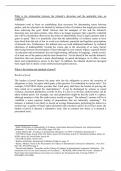Summary
Summary LLM International Dispute Resolution - International Commercial Arbitration I - Module 7 (Arbitral Procedure II)
What is party autonomy? What is harmonisation? What is the procedure for arbitration? What are terms of reference? What is PO1? What is case management conference? What is bifurcation? Who are emergency arbitrators? What is interim relief? What is expedited procedure? What is summary dism...
[Show more]




